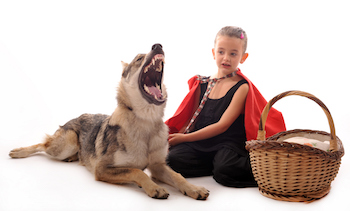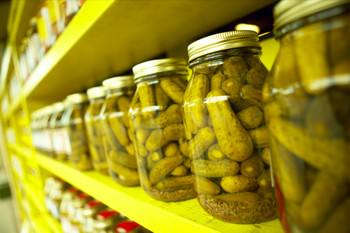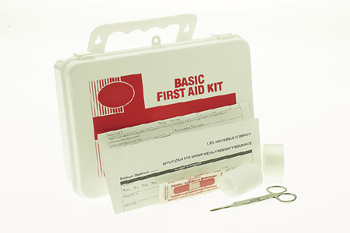Stay Informed
Popular Articles
- Hiatal Hernia: Hidden Cause of Chronic Illness
- Small Intestinal Bacterial Overgrowth (SIBO)
- Applied Lymphology: Unlocking the Secret to Pain Relief
- An Introduction to Constitutional Iridology
- The Low Down on Liver Detoxification
- An Energetic and Emotional Approach to Cancer
- Fat Facts
- Marrow in the Bones
- Blood Type and Nutrition
- Cardiac Herbs: Beyond Hawthorn
Quick Search
The School of Modern Herbal Medicine




Whose Afraid of the Big Bad...Whatever?
- 4/8/2009
- Categorized in: General Health
This is page 1 of a two-part article.
 A few years ago there were dire warnings and predictions about a new strain of Avian or “bird” flu that was threatening a flu epidemic like the one in 1918 that killed millions of people worldwide. After 9/11 there were scares about subsequent attacks using anthrax and biological agents. It seems like there's always some apolalyptic event on the horizon that the media sensationalizes to boost ratings. We continually hear dire warnings about this or that, yet very little of it actually materializes.
A few years ago there were dire warnings and predictions about a new strain of Avian or “bird” flu that was threatening a flu epidemic like the one in 1918 that killed millions of people worldwide. After 9/11 there were scares about subsequent attacks using anthrax and biological agents. It seems like there's always some apolalyptic event on the horizon that the media sensationalizes to boost ratings. We continually hear dire warnings about this or that, yet very little of it actually materializes.
If nothing else, these warnings generate popular demand for greater government protection — and pharmateuticals from the major drug companies, which are now the primary advertisers on TV and radio. And while many civil servants are genuinely concerned about public health, the dark side of all the paranoia is that people are afraid and more easily manipulated. Fear and anxiety motivate them to do just about anything to restore their sense of security, including gradually surrendering their freedom.
You won't see me running out to get a flu vaccine; I've never had one. I'm also not losing any sleep over purported drug shortages. But then, I'm a radical, free-thinking libertarian herbalist who prefers, as much as possible, to keep my mind focused on positive things. I like the quote from the Sci-fi novel Dune, “Fear is the mind killer.”
It's not that bad things don't happen, and it's not as if a plague couldn't happen. It has happened before and conditions are prime for it to happen again. After all, people's immune systems are so weakened from stress, poor nutrition and toxicity that they would be very susceptible to some new strain of microbe. It's also obvious that with modern transportation, it would be very difficult to contain the spread of contagious disease. And with her recurring hurricanes, tornadoes, floods and earthquakes, Mother Nature reminds us that she can wreak havoc with our “advanced” civilization.
Be Prepared
There are several reasons why I'm not worried about exotic strains of flu, Anthrax, SARS or West Nile virus. For starters, I was raised in a family that believed in preparedness. In fact, my mother was somewhat fanatical about it. We always had a year's supply of food in the basement, plus water and other emergency supplies. My religion taught, “If you are prepared, you will not fear,” and I have always sought to “be prepared.” (Yes, I was a boy scout, too—Eagle Scout, in fact.) So, there's never been a time in my adult life when I didn't have some emergency supplies on hand, including some emergency herbal remedies.
I guess because it was drilled into me from such an early age, I'm surprised by the number of people who have no supplies or plans for emergencies. It's like most people are living in denial, thinking that our modern technological society cannot be susceptible to man-made or natural disasters.
Maybe that's why everyone is rushing to point the finger of blame at somebody when disasters happen, as if it's always somebody else's responsibility to be prepared. Even worse, many people seem to think that if we just pass enough laws and set up enough bureaucracies that nothing bad will ever happen.
If anyone's living in that bubble, please wake up! No amount of legislation, no amount of foresight, and nothing we do is going to stop “bad” things from happening. It's just a part of life. As the libertarians say, “utopia is not an option,” at least not in this world. So, having recognized that disasters and problems can happen, what are our choices?
Well, we can bury our heads in the sand and think, “There's nothing I can do about it, so why bother preparing? If it happens, it happens and I'll deal with it then." We can also think, “I don't want to think about it, because thinking about emergencies will make them happen.” (This is a logical, but misguided interpretation of the idea that we “create our own reality” through our thoughts.)
We can also go to the opposite side of the spectrum and live in a constant state of preparation, thinking about every possible disaster and problem that might befall us and living in a constant state of fear and paranoia. Not a very good option, either.
We can also take a middle-of-the-road approach and realize that confidence and positive thinking comes from being prepared. Then, we make some basic preparations, and hope and pray we never have to use them.
Physical Preparation
 Let me share with you some of the ways I've physically prepared for emergencies. I have an emergency space heater in case the power goes out (which I had to use several times until they put new power lines into the area where I live). I have flashlights around for the same purpose, and I always know right where they are. I also have an emergency/first aid kit with bandages, herbal remedies, tweezers, scissors, candles, and other supplies. My kit even includes a battery powered flashlight and radio with a built in generator, so I could listen to the radio if the power goes out and have a flashlight with a battery that won't die on me. All this stuff is conveniently packed in a fishing tackle box for easy transport.
Let me share with you some of the ways I've physically prepared for emergencies. I have an emergency space heater in case the power goes out (which I had to use several times until they put new power lines into the area where I live). I have flashlights around for the same purpose, and I always know right where they are. I also have an emergency/first aid kit with bandages, herbal remedies, tweezers, scissors, candles, and other supplies. My kit even includes a battery powered flashlight and radio with a built in generator, so I could listen to the radio if the power goes out and have a flashlight with a battery that won't die on me. All this stuff is conveniently packed in a fishing tackle box for easy transport.
Since I like to go camping, I also have sleeping bags, a back pack, a tent and other supplies that I could use if I had to evacuate. I always keep food and water on hand for emergencies. Some of the food supplies are instant, eat-on-the-run supplies that could be taken with me in an emergency, but I also keep some long-term supplies on hand (grains, beans, honey, some canned goods and other foods that store well for long periods). I know that in the event of an emergency the grocery store shelves can be emptied in a matter of hours, so I want a little food on hand if I have to "hole up" for a while.
On the second page of this article I've listed my suggestions for an herbal first aid kit.
Mental and Spiritual Preparation
In addition to all these physical preparations, there are two other forms of preparation that provide even greater peace of mind. The first is the knowledge I possess. I've taken first aid classes. I've also studied outdoor survival, so I know how to find food in the wilds if I need to.
It has long disturbed me that our society has become so far removed from nature that we cannot sustain ourselves without a huge infrastructure to support us. Most people don't have the foggiest idea how to do the most basic things, such as start a fire (without matches or lighters), mend torn clothes, grow some fruits or vegetables in a garden, or perform other basic survival tasks. In native cultures, children mastered these skills by the time they were 12 or 13, so they knew how to sustain their own lives from Mother Nature's Supermarket.
So, it's no wonder people completely panic when cut off from civilization. They don't have the knowledge and skills necessary to survive. It's a shame we aren't taught these kinds of skills in public school instead of all the worthless information we memorized to take a test and then promptly forgot, never to use it again. But then, people wouldn't be so easily manipulated by fear if they had the knowledge of self-reliance, would they?
But knowledge or mental preparation isn't the most important preparation either. I think it's the sense of inner peace I've had through prayer, meditation and emotional healing work that has helped me the most. It's enabled me to learn to feel emotions such as fear, pain, etc., but not react to them. Thus, I can retreat to a place of inner calm when there's a crisis.
Action Plan
This article would be little more than my ranting and raving if I didn't supply you with an action plan. I really encourage all of you to put together an emergency first aid and preparedness kit. It should contain basic herbs and first aid supplies as well as items you'd need in an emergency, like matches, a flashlight, etc. Everyone should also have at least a 72-hour supply of food and water on hand for emergencies. It's not that hard to put something like this together, and it comes in handy for day-to-day “emergencies” as well.
More importantly, get some knowledge about how to use this stuff. Take a first aid class if you haven't done so. That way you know how to do mouth-to-mouth, CPR, apply pressure for bleeding, and other basic first aid skills. Go on an herb walk and learn to identify your local herbs. You're an herbalist, and people should be able to rely on you for help even if the time comes when you can't order commercially prepared remedies.
Now, to address the specific issue of the flu, let's remember that even in the Dark Ages, not everyone died when there was a plague. Some people were immune. The flu, like any other disease, is most likely to strike those who are susceptible, which means those whose immune systems are compromised.
So, taking care of your general health is one of the best ways to be prepared. Eat healthy, exercise, get enough sleep, learn how to manage stress, and take some basic supplements when colds or flu or whatever are going around to help ward them off. I've posted my suggestions for an emergency preparedness kit in a separate article.
Forget the vaccines. Flu strains mutate all the time, and public health scientists can't vaccinate against all of them. Furthermore, all the flu vaccine does is challenge your immune system so it can build up its own defenses. If you're immune compromised to begin with, then the vaccine can actually backfire and damage your body.
Opponents of vaccines claim that more people die from flu vaccines than actually die from the flu, but scare tactics are extremely useful in selling flu vaccines, aren't they?
Finally, learn to find a place of inner peace through prayer, meditation, or whatever process your faith suggests. The more you practice going to that inner place of peace, the easier it becomes to go there in a crisis. Of course, it also helps if you have a solid spiritual faith to anchor you in a time of crisis. Bad things will happen in everyone's life, and in case you haven't figured it out yet, we're all going to die someday. But, I still believe that if you are prepared (even for death), you won't be afraid.
